In its third edition, the festival attracted more than 800 people from the impact ecosystem to debate challenges and promote opportunities in a collaborative and diverse environment
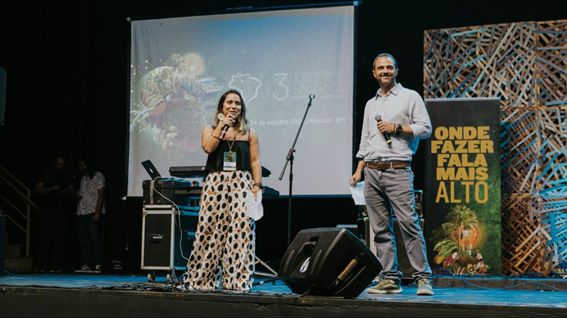
Juliana Teles (Impact Hub Manaus) and Mariano Cenamo (Idesam) | Photo: Take/FIINSA
Between October 22 and 25, Manaus became a hub for dialogues, experiences and connections between people engaged in the impact ecosystem. Held by the Amazon Conservation and Sustainable Development Institute (Idesam) and Impact Hub, with Fundo Vale among the main sponsors, the third edition of the Amazon Impact Investing and Sustainable Business Festival (FIINSA) took place under the slogan “Doing speaks louder.” The audience was three times larger than that of the first edition, held in 2018. More than 800 people, encompassing many sectors, backgrounds, ethnicities and occupations, were present, all focused on the same purpose: to boost and strengthen innovation and entrepreneurship to generate social and environmental benefits in the Amazon region.
The event featured more than 90 panelists and 30 discussions. Investors, representatives of traditional peoples, forest entrepreneurs, social organizations, startups, established companies and government agencies sat side by side to share different visions and experiences. The debates took place in six tracks: “Building an impact ecosystem in the Amazon,” “Entrepreneurial paths in the Amazon,” “Territorial development,” “The preserved forest economy,” “Social and biological diversity values” and “People who make an impact.”
In addition to these debates, FIINSA facilitated 24 connections between investors and ventures through business networking sessions organized by ForestFi and the Amazon Impact Accelerator (AMAZ). Fundo Vale took part in one of the evaluation panels in these sessions. In all, 17 businesses made pitches in closed sessions, with the expectation of raising more than R$1.7 million in total over the next few days.
“We are living through a challenging time, especially in the Amazon. On the one hand, we have a window of opportunity, particularly in the field of sustainable business. On the other hand, the climate crisis has imposed itself like never before, in this second year of extreme drought. Many positive things are happening, including in relation to public policies. We are seeing progress in socio-bioeconomy businesses, with the constant arrival of investors, new investment funds and strengthening programs. I see this moment as a great opportunity to show that the Amazon has a unique and promising economy,” said Márcia Soares, Fundo Vale’s Amazon and partnerships manager.
Field trip
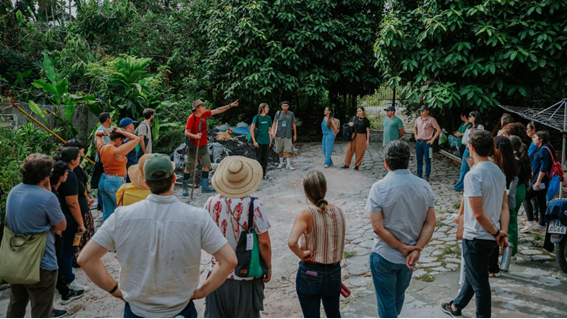
PANC Farm | Photo: Take/FIINSA
On the first day, this edition of FIINSA offered something new: an afternoon dedicated to field experiences in Manaus. Divided into five groups, 280 people visited places such as PANC Farm, which explores the culinary use of unconventional food plants, and the Amazon Biotechnology Center, which integrates science and traditional knowledge for positive impact solutions. The Business Incubation and Development Center presented innovative startups, while Impact Hub Manaus and Casarão Cassina ran workshops on social impact and business models. In Parque das Tribos, a large indigenous neighborhood of Manaus, the participants learned about social projects dedicated to urban indigenous communities.
Also read: Immersions in innovation, bioeconomy and social inclusion initiatives mark first day of FIINSA
Prospects for impact ecosystem in Amazon
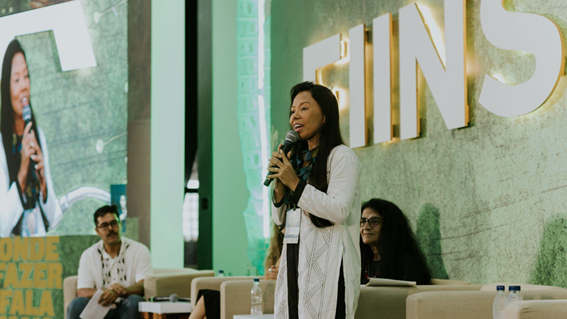
Vanda Witoto | Photo: Take/FIINSA
On the morning of the second day of the festival, panels discussed the global and local relevance of the Amazon, the climate change crisis, empowerment of traditional peoples and the challenges faced by forest entrepreneurs. The panelists emphasized that irresponsible exploitation of the Amazon is often driven by socioeconomic fragility, making it essential to create new opportunities for communities.
“People are afraid to invest in us, but I want to tell you not to be afraid. We’re the ones who should be afraid of many things that are imposed on us. But you don’t have to be afraid,” said Vanda Witoto, an indigenous leader and executive director of the Witoto Institute.
Read this full article about the morning of debates on the second day of FIINSA.
In the afternoon, 12 panels fostered dialogue on topics such as the effectiveness of investments in the region, logistical and marketing challenges, cooperation in impact ecosystems, the challenges of climate change for local businesses, territorial development and fair contracts.
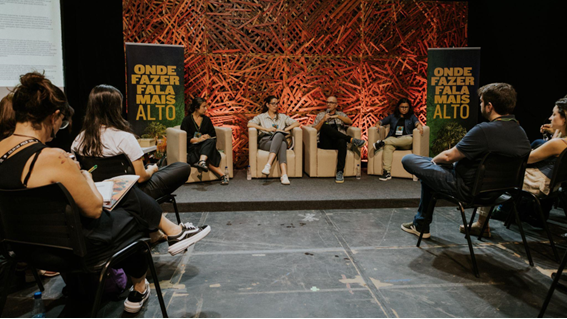
“Building Collective Impact” panel | Photo: Take/FIINSA
Nathália Cipoleta from Fundo Vale’s Strategy, Management and Impact Area took part in a panel called “Building Collective Impact,” which also featured representatives of Move Social, Conexus and Climate Ventures, to discuss challenges and solutions for measuring and managing social and environmental impact.
Also read: Fundo Vale debates impact measurement and management at FIINSA
Fundo Vale gets together with partners to celebrate 15th anniversary
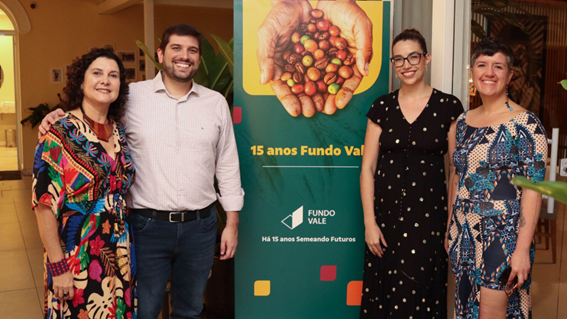
Fundo Vale’s Márcia Soares, Gustavo Luz, Nathália Cipoleta and Liz Lacerda
The evening of October 23 was marked by a special dinner hosted by Fundo Vale for its partners present at FIINSA, who have supported Fundo Vale in its purpose of generating positive social and environmental impact in the Amazon.
“This dinner is part of the celebrations of Fundo Vale’s 15th anniversary and symbolizes this commemoration of the progress made, despite the current challenges in the Amazon. We have many positive achievements, opportunities in sight and people who believe in a different future. All of you who are here are examples of those who work and believe that a positive and transformative agenda is possible. That’s the message we want to leave,” said Márcia Soares, Fundo Vale’s Amazon and partnerships manager.
During the dinner, Fundo Vale launched “Amazon: The Forest’s Past, Present and Future,” a special edition of the Stanford Social Innovation Review Brasil. (Read an article about this publication here.) linkar
Paths to make things happen
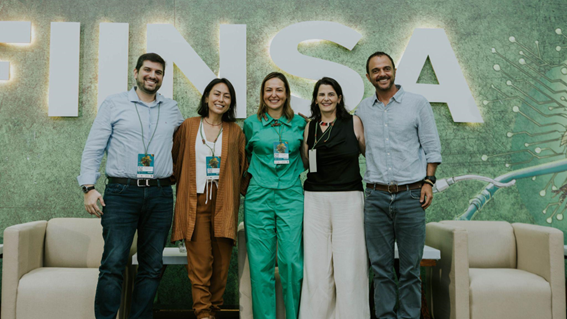
Gustavo Luz took part in debate on impact investing | Photo: Take/FIINSA
On the second day, panelists discussed the expansion of impact investments in Amazonian communities. They emphasized the need for innovation in investment models and the creation of trust between investors and local entrepreneurs. Gustavo Luz, Fundo Vale’s executive director, highlighted the use of blended finance, which combines philanthropy and market capital, as essential for strengthening sustainable businesses in the region.
The specific challenges of the Amazon, such as logistics and weather incidents, were addressed as aspects that should be considered when consolidating partnerships between companies, investors and communities. “Fundo Vale has been striving to develop solutions that allow capital to be adjusted to business needs, rather than adapting projects to traditional capital structures,” Luz said.
“FIINSA gave me many opportunities to understand not only the startup ecosystem, which is in its infancy and thriving, but also everything that involves impact entrepreneurship. There is great power here and a sense of community and values that we sometimes don’t realize. I leave here with a lot of insights and ideas in my suitcase,” said Juliana Sarilio, corporate venture capital manager at Banco do Brasil.
Read this full article about the morning of debates on the third day of FIINSA.
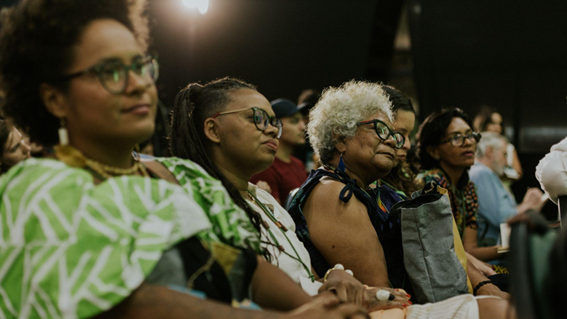
Photo: Take/FIINSA
In the afternoon, there were 12 more panels on the challenges and more specific aspects of impact entrepreneurship. There were debates about the carbon market’s challenges and opportunities, impacts on the Amazon from a female perspective, mistakes in investment prospecting, tourism, perspectives on fashion, art and design, the role of young leaders, and the representativeness of black people, among other topics. There was also an event called BIOHUB, offering an opportunity for the ecosystem to find inputs, solutions, services and products for production chains in the Amazon.
Rachel Maranhão is the CEO and co-founder of Mabé Bio, a green technology startup that is developing new plant-based materials. Her first product is an alternative material to animal leather, designed to serve different sectors looking to replace highly polluting materials with options that are positive and regenerative for nature. She said that FIINSA was a rich experience and an opportunity to make new connections.
“I was very positively surprised. I didn’t know the ecosystem here in the Amazon region, I didn’t know the different players, so it was very important for me to understand how things work, who the key players are and who we can ask for support,” she said.
Idesam’s 20th anniversary
The event also marked the 20th anniversary of the Amazon Conservation and Sustainable Development Institute (Idesam), one of FIINSA’s founding institutions. During a lunch attended by all the organization’s employees, as well as partners, Idesam’s achievements were recalled and people who have been part of its history were acknowledged.
Fundo Vale was among the partners recognized, representing Idesam’s entire group of funders, for its partnership since the organization’s early years. “We supported the coffee business Café Apuí when it was still just a project, around 2013, in the context of green municipalities. Then we supported it as a business, followed by the Priority Bioeconomy Program and the Amazon Impact Accelerator (AMAZ). So, it’s been a long trajectory of partnership and trust,” said Márcia Soares.
Amazon Market
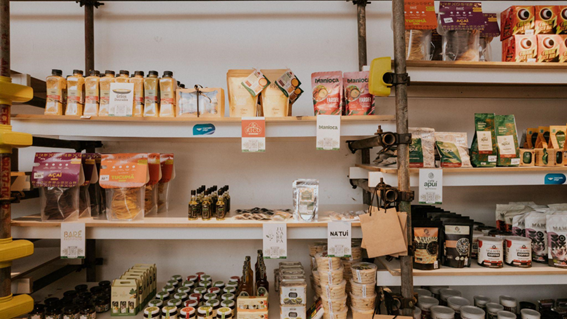
Photo: Take/FIINSA
Another highlight of this edition of FIINSA was the Amazon Market, which generated around R$115,000 in sales. Coordinated by Inatú Amazônia and curated by the Amazon Impact Accelerator (AMAZ), Assobio, the Amazon at Home, Intact Forest initiative and the Priority Bioeconomy Program, the space brought together more than 50 brands. The curation was designed to present a wide range of products with sustainable origins, harnessing the social and biological diversity of the Amazon, including food items, cosmetics, indigenous handicrafts and fashion pieces.
“The curation involved brands that guarantee the traceability of their products, fair trade and care not only for nature, but also for the people who live in the Amazon,” explained Louise Lauschner, Idesan’s specialist in Amazon production chain marketing.
Closing event
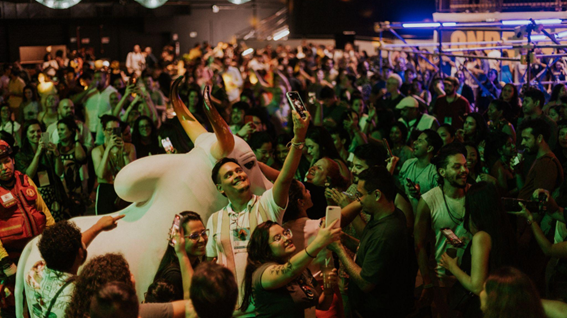
Photo: Take/FIINSA
The third edition of FIINSA ended with a celebratory party featuring regional musicians and performances by the Garantido and Caprichoso folklore groups. The organizers celebrated the festival’s success.
“The strength here is enormous. The energy that flowed through these rooms during these days was huge. Throughout these three days, there was an atmosphere of respect and collaboration, in which ideas were shared constructively, even when they differed. Our feeling is one of accomplishment,” said Idesam’s Mariano Cenamo.
